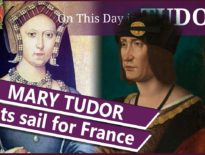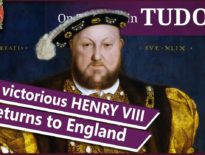On this day in Tudor history, 1st October 1500, John Alc*ck, Bishop of Ely, died at Wisbech Castle.
Alc*ck wasn’t just a bishop, he was a scholar, a royal tutor, and an administrator. He served as tutor to King Edward IV's son, Prince Edward, the future King Edward V and a boy who is known for being one of the ill-fated Princes in the Tower. He also christened another prince.
Find out more about this Tudor bishop and royal servant in today's talk.
Also on this day in Tudor history, 1st October 1553, Mary I was crowned queen at Westminster Abbey by Stephen Gardiner, Bishop of Winchester.
It was a moment of real triumph for Mary and she was England's first official queen regnant.
In last year’s video, I shared details from primary sources about Mary's I's coronation ceremony, and also the sumptuous banquet afterwards, which saw the Duke of Norfolk and the Earl of Arundel on horseback in the hall, and a challenge being made. What a spectacle it must have been!
Also on this day in history:
- 1505 – Death of Sir Henry Colet, merchant and Lord Mayor of London, at Stepney. He was buried there.
- 1526 – Birth of Dorothy Stafford, Lady Stafford, daughter of Henry Stafford, 10th Baron Stafford, and his wife, Ursula (née Pole). Dorothy married Sir William Stafford, widower of Mary Boleyn, in 1545. She served Elizabeth I as a gentlewoman of the Privy Chamber.
Transcript:
1 October
On this day in Tudor history, 1st October 1500, John Alc*ck, Bishop of Ely, died at Wisbech Castle..
Alc*ck wasn’t just a bishop, he was a scholar, a royal tutor and an administrator. Let me tell you a bit more about this man.
• John Alc*ck was born in 1430 in Beverley, Yorkshire, and was the son of William Alc*ck, who came from Hull.
• Alc*ck received a grammar school education at the school attached to Beverley Minster before studying at Cambridge University. He’d attained a doctorate in civil law by 1459 and worked in church administration in London.
• In the late 1460s, he was admitted to the prebends of Browneswood, St Paul’s, and then North Alton, in Salisbury Cathedral.
• In 1469 and 1470 he was a member of panels hearing debt cases.
• In April 1471, Alc*ck was in favour with King Edward IV, who had just returned from exile to reclaim the throne, and was appointed dean of the royal free chapel of St Stephen, Westminster, and, in the same month, was appointed keeper of the rolls of chancery.
• In 1471, Alc*ck was appointed as administrator of King Edward IV’s eldest son, Prince Edward’s lands and properties in Wales, Cornwall and Cheshire. The prince was just a baby.
• He was made Bishop of Rochester in 1472 and was responsible for keeping the great seal from September 1472 to June 1473.
• In 1473, Alc*ck was appointed as three-year-old Prince Edward’s tutor and president of the prince’s council at Ludlow.
• While the king was campaigning in France in 1475, with his chancellor, the Bishop of Lincoln, Alc*ck served as chancellor in England.
• In 1476, Alc*ck became Bishop of Worcester.
• In 1483, following Edward IV’s death, and the accession of the boy-king, Edward V, Alc*ck’s pupil, the new king’s uncle, Richard, Duke of Gloucester, took the throne as Richard III, claiming that Edward and his siblings were illegitimate. It is not known what Alc*ck thought of the events of 1483.
• In October 1485, following Henry Tudor’s accession to the throne as Henry VII, after the Battle of Bosworth, Alc*ck was appointed as chancellor and preached the sermon opening the king’s first parliament in November 1485.
• In March 1486, John Morton, Archbishop of Canterbury, was made Lord Chancellor following his return from exile, but Alc*ck still served as a trusted advisor and councillor.
• In the summer of 1486, he was leader of a delegation that negotiated a truce with Scotland, and in September 1486 he christening Prince Arthur, eldest son of Henry VII and Elizabeth of York, at Winchester. He was made Bishop of Ely the following month.
• As well as being a clergyman and royal administrator, Alc*ck was involved in endowments and building projects, for example, the founding of a chantry and school in the grounds of Holy Trinity, Hull, where his father had been laid to rest; the rebuilding of a church at Little Malvern Priory, and the building of a great hall at the bishop’s palace in Ely, as well as a chantry chapel in the cathedral.
• Alc*ck was also a scholar and wrote a number of religious texts.
• Alc*ck died on this day in 1500 and was buried at Ely Cathedral, in the beautiful chantry chapel he’d had built.



I wonder if he knew anything about what happened to them, good or bad. Interesting man and a good age for those times.